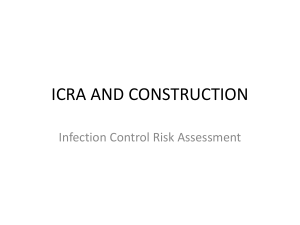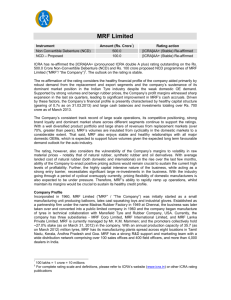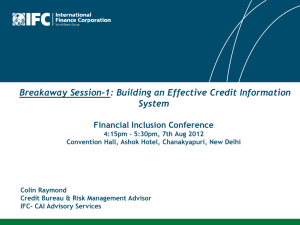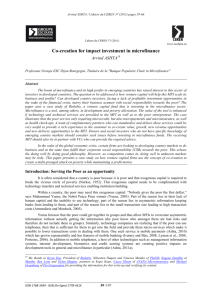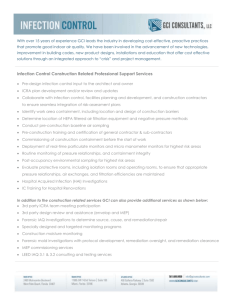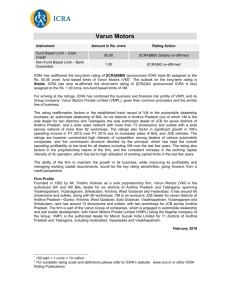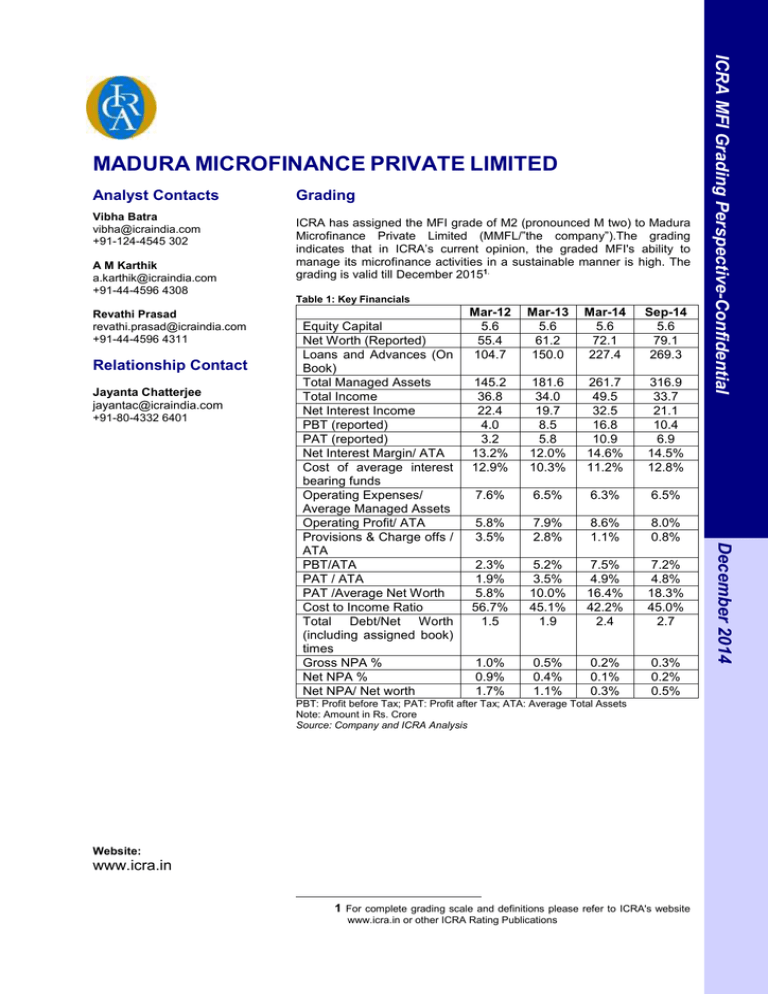
Analyst Contacts
Vibha Batra
vibha@icraindia.com
+91-124-4545 302
A M Karthik
a.karthik@icraindia.com
+91-44-4596 4308
Revathi Prasad
revathi.prasad@icraindia.com
+91-44-4596 4311
Relationship Contact
Jayanta Chatterjee
jayantac@icraindia.com
+91-80-4332 6401
Grading
ICRA has assigned the MFI grade of M2 (pronounced M two) to Madura
Microfinance Private Limited (MMFL/”the company”).The grading
indicates that in ICRA’s current opinion, the graded MFI's ability to
manage its microfinance activities in a sustainable manner is high. The
grading is valid till December 20151.
Table 1: Key Financials
Mar-13
5.6
61.2
150.0
Mar-14
5.6
72.1
227.4
Sep-14
5.6
79.1
269.3
145.2
36.8
22.4
4.0
3.2
13.2%
12.9%
181.6
34.0
19.7
8.5
5.8
12.0%
10.3%
261.7
49.5
32.5
16.8
10.9
14.6%
11.2%
316.9
33.7
21.1
10.4
6.9
14.5%
12.8%
7.6%
6.5%
6.3%
6.5%
5.8%
3.5%
7.9%
2.8%
8.6%
1.1%
8.0%
0.8%
2.3%
1.9%
5.8%
56.7%
1.5
5.2%
3.5%
10.0%
45.1%
1.9
7.5%
4.9%
16.4%
42.2%
2.4
7.2%
4.8%
18.3%
45.0%
2.7
1.0%
0.9%
1.7%
0.5%
0.4%
1.1%
0.2%
0.1%
0.3%
0.3%
0.2%
0.5%
PBT: Profit before Tax; PAT: Profit after Tax; ATA: Average Total Assets
Note: Amount in Rs. Crore
Source: Company and ICRA Analysis
Website:
www.icra.in
1 For complete grading scale and definitions please refer to ICRA's website
www.icra.in or other ICRA Rating Publications
December 2014
Equity Capital
Net Worth (Reported)
Loans and Advances (On
Book)
Total Managed Assets
Total Income
Net Interest Income
PBT (reported)
PAT (reported)
Net Interest Margin/ ATA
Cost of average interest
bearing funds
Operating Expenses/
Average Managed Assets
Operating Profit/ ATA
Provisions & Charge offs /
ATA
PBT/ATA
PAT / ATA
PAT /Average Net Worth
Cost to Income Ratio
Total Debt/Net Worth
(including assigned book)
times
Gross NPA %
Net NPA %
Net NPA/ Net worth
Mar-12
5.6
55.4
104.7
ICRA MFI Grading Perspective-Confidential
MADURA MICROFINANCE PRIVATE LIMITED
ICRA MFI GRADING PERSPECTIVE
MADURA MICROFINANCE PRIVATE LIMITED
Grading Rationale
The grading factors in MMFL’s ability to scale up operations (loan book grew by 52% in FY2014 and18% in
H1FY2015, over March 2014 and stood at Rs 269 crore as on September 30, 2014) while maintaining good
profitability indicators ((PBT/ATA of 7.5% in H1FY2015 (provisional) and 7.2% in FY2014)) supported by improved
Net Interest Margin (NIM) and reduction in credit costs. The grading also factors in MMFL’s strong investor profile,
experienced Board of Directors (BoD) and management team, adequate loan monitoring and collection
mechanisms supported by strong Management Information Systems (MIS) and its ability to raise funds from about
18 lenders at competitive rates to fund its growth while maintaining a comfortable liquidity profile. The grading is
however constrained by MMFL’s geographically concentrated nature of operations with around 97% of the
portfolio being concentrated in the state of Tamil Nadu and relatively high expansion plans of the company (CAGR
of 30-35%) over the next three years.
Company Profile
Madura Microfinance Limited (MMFL) is a non-banking finance company (NBFC) established in 2005 and started
operations in early 2006. MMFL obtained a NBFC-MFI license in November 2013.The CMD of the company, Dr.
Tara Thiagarajan has a 48% equity stake in MMFL, while one MFI-focused private equity investor – Elevar Equity
– holds 22% stake. MMFL is engaged in providing credit to economically backward women through the Self Help
Group (SHG) mechanism. MMFL had a loan portfolio of Rs. 269 crore in September 2014 (Rs.175 crore in
September 2013), of which 97% of portfolio comprises of SHG loans and 3% accounted for asset backed retail
loans. As in Sep-14, MMFL operates in 33 districts of Tamil Nadu, 2 districts of Karnataka and one district of
Maharashtra across 217 branches and has over 2.47 lakh members.
For the year ended March 31, 2014, MMFL reported a net profit of Rs. 10.9 crore on a total asset base of Rs.
262.7 crore compared to Rs. 5.8 crore net profits on an asset base of Rs. 182.1 crore in fiscal 2013. MMFL
reported provisional profit before tax of Rs. 10.50 crore on a total asset base of Rs. 317.9 crore for H1FY2015.
Table 2: Share Holding Pattern as on September 30, 2014
Ms. Tara Thiagarajan
Mr. M. Narayanan
Mr. Marti Subramaniam
Mr. Ashok Mirza
Mr. M.V. Subbiah
Mr. M.R. Ramaraj
Employees’ Welfare Trust
Employees
Elevar Unitus Trust
Total
ICRA Rating Services
% of Paid up Capital
48.05%
5.76%
5.40%
3.60%
1.80%
1.80%
9.07%
2.79%
21.73%
100.0%
Page 2
ICRA MFI GRADING PERSPECTIVE
MADURA MICROFINANCE PRIVATE LIMITED
Strengths
Experienced board and management team.
Good loan monitoring and control systems; IT system is based on mobile technology and data is updated on
real-time basis.
Capitalization levels presently comfortable; however, company would need external equity support for medium
term growth
Improvement in asset quality with significant reduction in delinquencies over past year; portfolio vulnerability
however, remains high owing to weak credit profile of the customer segment
Challenges
Geographically concentrated nature of operations as the entire portfolio is restricted to Tamil Nadu with 66%
of portfolio is concentrated in 5 districts
To overcome competition from other MFIs given the relatively high MFI penetration in Tamil Nadu
To diversify funding mix at competitive rates so as to be able to achieve the growth plans
Ability to recruit and train personnel to meet the expansion plans and attrition rates especially at field level
ICRA Rating Services
Page 3
ICRA MFI GRADING PERSPECTIVE
MADURA MICROFINANCE PRIVATE LIMITED
Business Risk Profile
Table 3: Highlights of MMFL’s Operations
No. of States
No. of Districts
No. of Branches
No. of Active Members (Lakhs)
Credit Portfolio (Rs. Crore)
Number of Field Officer
Active Borrowers per field officer
Active Borrowers per branch
Portfolio per branch(Rs crore)
Mar-12
1
29
212
2.13
142.20
656
324
1004
0.67
Sep-12
1
29
202
1.75
127.99
619
283
867
0.63
Mar-13
1
29
194
1.73
151.63
499
347
892
0.78
Sep-13
1
29
194
1.94
175.28
478
407
1002
0.90
Mar-14
3
33
201
2.09
230.11
453
461
1040
1.14
Sep-14
3
36
217
2.45
269.25
528
464
1129
1.24
Madura Microfinance Private Limited (MMFL) is involved in microfinance business, with presence in about 33
districts in Tamil Nadu, 2 districts in Karnataka and one district in Maharashtra. MMFL extends credit under the
Self Help Group (SHG) model, wherein the group members undertake the responsibility of forming the group, joint
liability, and repayments. The groups are formed and trained by the MMFL directly. The group size typically varies
from 15 to 20.The borrowers, who are women, come from a weak economic background with very limited access
to organised credit and credit history. While this makes the lending risky (the loans being unsecured), the group
dynamics is expected to be effective in curtailing shortfall in collections from any borrower. The borrowers typically
are involved in small trade, cottage industries, animal husbandry activities, and agricultural based activities.
MMFL focuses only on rural and semi-urban areas and offers loans of various ticket sizes in the range from Rs.
14,000 to Rs. 42,000 for group loans In September 2014, the proportion of loans with ticket size more than Rs.
15,000 stood at about 60% as in September 2014. MMFL offers group loan products with interest rate of
25.6%.The tenure of loans varies from 16-36 months. The company also provides an individual loan product to the
borrowers who are in the higher loan cycle and established a good repayment track record. The tenure of these
loans is 2 years and same interest rate as group loans.
In order to take advantage of the 15% bucket provided by the RBI Guidelines, the company has introduced asset
backed micro enterprise loans to small retail traders and also. The sourcing for these loans is done through retail
distributors like Pepsico, ITC etc. These loans would be on hypothecation of stocks. These loans are in the ticket
size range of Rs.25K to Rs. 50K and can go up to Rs.1 lakh depending on the size of the borrower with an interest
rate of 25.8%.The tenure for these loans are 6 months with weekly collections. Apart from loans, the company
also offers Micro Business Education (MBE) service scheme wherein the company provides a mini MBA certificate
program. Post completion of the course the certified individual is eligible to take an additional loan of Rs.
10,000. MMFL charges Rs. 500 for the above mentioned program. The course was developed in collaboration
with Dr. Madhu Viswanathan of the Marketplace Literacy Project and University of Illinois at Urbana Champaign
based on learning’s from over 100 case studies of subsistence marketplace entrepreneurs.
MMFL registered a portfolio growth of about 51% to Rs. 227 crore during FY2014 owing to improved access to
funding. The company’s portfolio as on September 2014(Portfolio of Rs.269 crore) comprised mostly (more than
97% of the total portfolio) of group loans with a member base of 2.5 lakh (1.7 lakh in March 2013) and 3% of
portfolio comprises of retail loan products.As for borrower vintage, owing to the high business growth, first cycle
loans accounted for about 36% of the total portfolio as on September 2014. This ratio is expected to remain high
in the medium term, owing to the high growth plans of the company. MMFL intends to grow its portfolio by at least
50% in FY2015. While the company is currently adequately capitalized to achieve this growth target, however it
would need equity infusions to meet its growth plans in the short to medium term (CAGR at 30-35% for next three
years). The ability of the company to raise funds would be a key consideration to be able to achieve the target
growth level. The company would also need to tap other debt market funding sources to diversify its resource
profile. It would also be important for the company to recruit and train personnel going forward, in line with the
planned expansion. In this context, the training procedures at MMFL are standardized and are provided by internal
staff. The company also has a well planned calendar for training existing employees on a quarterly basis.
In terms of geographical presence, almost 97% of the loan portfolio of MMFL remains concentrated in the state of
Tamil Nadu (TN) and Karnataka (2%) and Maharashtra (1%) as on September 14, ICRA takes note of the
initiatives taken by the company to geographically diversify their operations; the same however are still at early
stages. The company commenced operations in the state of Karnataka and Maharashtra in the current financial
year and proposes to expand into Madhya Pradesh, in the measured manner, by the end of the current financial
year.Going forward company continues to expand its presence in TN and along with the prudent expansion in the
other states.
ICRA Rating Services
Page 4
ICRA MFI GRADING PERSPECTIVE
MADURA MICROFINANCE PRIVATE LIMITED
Operating Environment
MFIs reported over 40% annualized growth during the two years ended March 2014 after the period of stress
post-AP crisis when funding sources had dried up. The growth was supported by better availability of funds, strong
branch expansion, and increase in ticket size. Significantly, even after the impressive growth during the last two
years, the untapped potential remains large. This, along with the expansion plans of MFIs and the expected fund
availability, is likely to enable a 30-35% annualized rate of growth over the next three years. Further, the RBI, in
June 2014, has allowed non deposit accepting NBFC-ND to be business correspondents (BC), which is likely to
provide a fillip to financial inclusion and to the business prospects of MFIs. However, while the growth prospects
for MFIs are favourable, recruitment, employee-training and employee-retention are likely to remain critical
performance-determining factors, given that the employee attrition rate in the industry remains high at an annual
30-40% even as most MFIs are into a significant expansion drive.
MMFL’s operations are largely concentrated in the state of Tamil Nadu (TN). MFI penetration in TN is quite high
with presence of about 20 MFIs. The above is expected to result in high competitive pressures for the players with
TN concentrated portfolio profile, including MMFL.
As for the regulatory environment, RBI has put in interest rate caps as well as interest margin caps in place, which
have forced MFIs to take several initiatives to cut operating costs including optimization of branch costs and
manpower, increase in loan sizes and automation of processes, among others. Managing costs has become even
more important as the net interest margins for MFIs has been capped from April 2014 at 10% for MFIs with a loan
portfolio of more than Rs. 100 crore and at 12% for MFIs with a loan portfolio of less than Rs. 100 crore.
Further mandatory use of credit bureaus and debt ceilings have restricted overleveraging for borrowers and are a
positive for the sector in the long term. Since these regulatory changes were introduced, almost all the NBFCMFIs have started contributing data to the credit bureaus. This has helped in checking the number of loans,
quantum of loans and credit track record of a borrower. These checks have helped in reducing incidence of
overleveraging as well as filtering of delinquent borrowers-these measures are likely to have a good long term
impact on credit quality of the MFIs. However some banks which have ventured into microfinance and most of the
SHGs still donot contribute the data to credit bureaus.
Though the overall operating environment is improving, some MFIs are venturing into relatively riskier individual
loans and other secured and unsecured loan products, while remaining focused on politically and communally
sensitive borrower groups. The external factors such as occurrence of political or communal issues may also have
a long-term impact if they affect the credit culture of the borrowers at large. Though the potential remains huge,
maintaining control over asset quality by building strong systems without compromise on internal audit and
controls and building adequate cushions to absorb event risks would be important for NBFC-MFI’s credit profile.
ICRA Rating Services
Page 5
ICRA MFI GRADING PERSPECTIVE
MADURA MICROFINANCE PRIVATE LIMITED
Governance Structure, Management and Systems
Ownership and Board Structure
Table 4: Shareholding pattern as in September 2014
Shareholder Name
% Share
Ms. Tara Thiagarajan
Mr. M. Narayanan
Mr. Marti Subramaniam
Mr. Ashok Mirza
Mr. M.V. Subbiah
Mr. M.R. Ramaraj
Employees’ Welfare Trust
Employees
Elevar Unitus Trust
Total
48.05%
5.76%
5.40%
3.60%
1.80%
1.80%
9.07%
2.79%
21.73%
100.00%
The CMD of the company, Dr. Tara Thiagarajan has a 48% equity stake in MMFL, while one MFI-focused private
equity investor – Elevar Equity – holds 22% stake. The company is currently comfortable on capitalization and
considering its growth outlook the management is willing to dilute the stake as and when required.
Table 5: Board of Director as in September 2014
Shareholder Name
Dr. Tara Thiagarajan
R. Ramaraj
Ashok Mirza
N C Sarabeswaran
Rahul Verma
Sandeep Farias
Vipul Rawal
% Share
Chairman and Managing Director
Independent Director
Independent Director
Independent Director
Independent Director
Nominee Director (Elevar Equity)
Nominee Director (Elevar Equity)
The Board consists of 7 directors; of which one whole time director, two independent directors, one investor
director and 3 promoter directors which are people with vast industry experience. The company’s managing
director and chairperson, Ms. Tara Thiagarajan, has adequate experience in microfinance and rural sectors. The
board is supported by a three-member advisory committee, which comprises Mr. Karti Sandilya, Mr. M.V.
Subbiah, and Dr. Marti G Subramanyam Elevar Equity has two nominee directors on the board of directors. All the
board members have a rich experience from diverse fields including retail banking and accounting, IT &
microfinance. The composition if the Board has remained stable and there have not been any resignations at least
in the past 2-3 years. The board meets on a quarterly basis and if required it may meet more often. The Board is
involved to a large extent in strategy, policies and areas of improvement. An annual strategy meet is held to
discuss in detail the strategy for the forthcoming year. The operational performance is discussed with the Board in
every meeting.
Management
The Chairman and Managing Director of the company, Dr. Tara Thiagarajan is primarily involved in strategic
decision making; the senior management has vast experience in the lending business – mainly retail products in
state of Tamil Nadu – target market of MMFL. While the Board takes strategic decisions, the operational
management is handled by the Branch Managers and office staffs of MMFL. The Board members have a good
experience in various fields of business including banking, financial services, human resources etc. The Board
has been associated with the company for a considerable time period and has developed expertise in the
microfinance sector over this period.
Systems and Processes
MMFL’s overall systems and processes compare well with its peers. All collections and attendance pertaining to
the centers are updated on a real-time basis through a mobile application. There is an online portal developed,
“Shakthi Sangamam”, which provides a database of the transaction summary of all the borrowers within each
SHG across clusters. The company has an established system to perform pre-disbursal checks with Credit
Bureau in a centralized fashion.
Disbursements are made at the branch only by a Cluster Manager and house verification is done for all borrowers
prior to disbursal by the field officer and mentors. The cluster manager also verifies the residence of the borrowers
on a sample basis. A Credit Bureau (Hi-mark) check is carried out of all the borrowers prior to disbursement and
ICRA Rating Services
Page 6
ICRA MFI GRADING PERSPECTIVE
MADURA MICROFINANCE PRIVATE LIMITED
only compliant borrowers are considered for credit. A post-disbursement end-use verification is carried out by the
mentor and cluster Manager. The loan utilization document is kept along with loan papers.
Cluster offices are computerized and all data entry and records are maintained at the cluster office. All cluster
offices are connected to the Head Office. The mentor centers are provided with cashiers with mobile phone with
GPRS connection and a printer, where the groups remit their collections. The Cashiers enter the details in the
mobile and prepare a receipt and handed over to the group members while collecting the money. The data is
transferred to the corporate office Server through GPRS immediately after the transaction is over. Cluster
Manager would report to Regional Manager at Head Office the day’s transactions (EOD status) in a daily report.
The company however faced some delinquencies in the past owing to misappropriation of funds by Member
Development Associate (MDA) who are responsible for group formation for the loan originated in FY2011. Since
FY2011 company has gradually removed the MDA layer in the employee hierarchy due to deterioration in the
credit culture in SHG group formed by MDA. Presently, Member Welfare Associates (field officers) are responsible
for even group formation and training. Having the MDA layer have been removed currently, the company has
been able to minimize the delinquencies to the extent. The management indicated that above change has
minimized the delinquencies and helps in filtering the bad credit.
Internal Audit Systems
The internal audit processes of the company are strong wherein a comprehensive audit is conducted for every
branch on a quarterly basis covering the key business aspects. The company’s operational audits are being done
by an external audit team comprising of 7 members with experience in banking and financial services industry.
Apart from the above, the company has a 12 personnel borrower-quality audit team to verify the quality of the
members/borrowers enrolled before the disbursal of the entry level loan and, to verify the process implementation
at the group level, of the groups which are in the repeat cycle. ICRA takes note of the initiatives takes by the
company to augment its internal audit processes by adding the borrower-quality audit team, however believes that
the scope of overall operational audit could be enhanced further. The company has also formalized training
procedures and manuals at all levels. MMFL has also put in a formal grievance redressal mechanism in place.
Accounting Policies
MMFL’s accounting policies are generally in-line with the accepted accounting norms for microfinance companies.
The company has a conservative provisioning policy and, the aggregate provisions held by the company are
higher than those mandated by RBI for NBFC-MFIs.
Scalability
Largely dependent on bank funding; however company is expected to diversify the same over in the near
to medium term
Table 6: MMFL’s Capitalisation Indicators
Rs. Crore
Mar-12
Net worth
55.4
Borrowings
Term Loan from banks
Term Loan from FI
Total Borrowings
Gearing
73.8
8.5
82.3
1.5
%
Mar-13
%
61.2
90%
10%
100%
105.5
11.8
117.3
1.9
Mar-14
%
Sep-14
provisional
79.1
%
81%
19%
100%
150.9
64.7
215.6
2.7
70%
30%
100%
72.1
90%
10%
100%
141.9
33.4
175.3
2.4
MMFL demonstrated a healthy growth in the business, with disbursements of about Rs.223 crore in FY2014 and
Rs.138 crore in H1FY2015 as compared to Rs.141 crore in FY2013. During FY2014, the company was able to
secure fresh funds of about Rs.107 crore from the banks which supported healthy business growth in the previous
year at an incremental cost of 14-14.5%.MMFL has access to large number of lenders, although primarily
banks/NBFCs for meeting its funding requirements. As on September 2014, its borrowings comprised loans from
fourteen banks (70% of total borrowings), one financial institution (7%), and loans from three NBFC (23%).The
company is taking initiatives to diversify its funding profile, by securing funds via NCD and the ECB route. Going
forward, MMFL’s ability to consistently raise funds from diverse sources and at competitive rates as the business
expands would be important from a grading perspective.
Based on the current sanctions in hand, the company would be able to meet incremental planned disbursements
for about 3 months, however regular flow of funds would be crucial to maintain as well as grow business
operations over longer term
ICRA Rating Services
Page 7
ICRA MFI GRADING PERSPECTIVE
MADURA MICROFINANCE PRIVATE LIMITED
Capitalization profile moderated due to sharp business growth;
Table 7: MMFL’s Capitalisation Indicators
Rs. Crore
Tier I Capital (%)
Tier II Capital (%)
Total Capital (%)
Gearing (on managed assets basis2) (times)
Mar-12
46.5%
0.0%
46.5%
1.5
Mar-13
34.1%
0.0%
34.1%
1.9
Mar-14
27.8%
0.0%
27.8%
2.4
Sep-14
26.2%
0.0%
26.2%
2.7
Capitalisation levels were comfortable (Net Worth of Rs 82.5 crore, gearing including off balance sheet book of 2.6
times as on September 30, 2014) supported by healthy internal generation of about 15-16% .However
capitalization profile was moderated during FY2014, as the company grew its portfolio at a very strong pace of
about 52% during the year, although the internal generation was good at about 16%. Consequently, the gearing of
the company increased to 2.6 times as in September 2014, as compared to about 1.9 times in March 2013
While the company is currently adequately capitalized (capital adequacy ratio (CAR) of 26.18% as in
September 2014) to meet its growth plans in the medium term. ICRA envisages the company to have
moderate internal accruals of 9%-12% and given its significant growth plan (30-35% CAGR for the next 3
years), they would require equity infusion of Rs. 40-50 crore in this period, to meet their growth targets in
line with their business plan, while maintaining adequate capitalization levels.
Human resources
With the scaling up of business, the company would also require trained employees to support its operations. At
the field officer level, the basic skills required are that they should have passed Class 10, with knowledge of the
local language. The training procedures are standardised. Every employee goes through 5 days of classroom
training, followed by a test and 15 days of field training, post which the loan officer can independently conduct
group meetings. The company has a well planned training calendar for the existing employees for training the
employees on soft skills as well as products. All the training provided is internal and the company has not tied up
with any external agency for any training.
Field officers are part time employees with no fixed pay component. On an average, a MWA (field officer) is
expected to handle around 800 borrowers and paid a salary of about Rs. 2,000-5,000 per month which is relatively
lesser than other MFI’s salary payout. Salary depends on the number of SHG borrowers, groups formed and
quality of SHG borrowers. The company continues to follow part time employee structure in TN since the most of
the field officers are women’s who are erstwhile members of the company. Field officers have been deployed in
the location where they belong to. The company has employed filed officers as full time employees in newer
geographies i.e. Karnataka and Maharashtra. While a part time employee structure enables the company to keep
its employee expenses at relatively lower levels vis-à-vis peers, ability to maintain control over the employees
would be important to maintain its asset quality indicators.
At the field level, the field officers report to the mentors who in turn report to the Cluster Managers. Each cluster
manager handles 3-4 cluster centers and reports to a regional manager who. The regional manager reports to the
reports to the Head of Operations. The attrition rate of the company is 8%-10% as a whole. For the trainee field
officers, the attrition rate is higher about 10%-12%, while at the level of confirmed field officers it is relatively lower
and that at the senior level is very low at about 2-5%. Going forward, ability of the company to manage the growth,
recruit and train personnel in line with the planned branch and geographical expansion plans, while maintaining
the asset quality indicators in the newer geographies would be important from a grading perspective.
Asset Quality
Though the company faced with high delinquencies in the past (originations in FY2011 and FY2012) on account
of misappropriation of funds by field officer, however initiatives taken by the company to reduce the
delinquencies through strengthening of control mechanisms which has led to stabilization of asset quality
between Mar-13 till Sep-14(90+ dpd stood at 0.19% as on Sep-14 as compared to 0.38% as on Mar-13).
Loan originations over the last two years have demonstrated good collection efficiency
Nevertheless, the company remains exposed to asset quality related risks, as its operations are concentrated in
the 33 districts of Tamil Nadu,2 districts of Karnataka and one district of Maharashtra and ability of the company to
diversify operations while maintaining asset quality indicators remains to be seen.
ICRA Rating Services
Page 8
ICRA MFI GRADING PERSPECTIVE
MADURA MICROFINANCE PRIVATE LIMITED
Financial Performance
Profitability
Table 8: Trend in MMFL’s Profitability indicators
Effective Yield on Average Advances2
Effective Yield on Average Earning Assets1 (A)
Cost of interest bearing funds (B)
Gross Interest Spread (A – B)
Net Interest Margin3
Operating Expense/ Average Managed Assets
Cost-Income Ratio
Credit Provisions/ Average Assets
Net Profit / Average Assets
Return on Average Net Worth
Mar-12
12M
25.2%
21.3%
12.9%
9.3%
13.2%
7.6%
56.7%
3.5%
1.9%
5.8%
Mar-13
12M
22.5%
18.4%
10.3%
9.1%
12.0%
6.5%
45.1%
2.8%
3.5%
10.0%
Mar-14
12M
25.4%
22.4%
11.2%
12.3%
14.6%
6.3%
42.2%
1.1%
4.9%
16.4%
Sep-14*
6M
27.1%
24.6%
12.8%
13.2%
14.5%
6.5%
45.0%
0.8%
4.8%
18.3%
*Provisional numbers
As for earning profile, the profitability indicators (PAT/ATA) of MMFL improved from 3.5% in FY2013 to 4.9% in
FY2014 and 4.8% (provisional) in H1FY2015 on account of a steady portfolio growth during the year, which
resulted in the improvement in the company’s NIM and, due to the moderation in the credit costs. MMFL’s NIMs
improved from about 14.6% for FY2014 and H1FY2015 as compared to 12% in FY2013. The company’s credit
costs moderated to about 1.1% in FY2014 (0.8%, provisional, in H1FY2015) as compared to 2.8% in FY2013, as
the write-offs moderated and the company was also able to make recovery from the earlier written-off accounts.
Going forward, ICRA expects the company’s overall credit cost to moderate and stabilize at about 0.6-0.7% levels
as incremental write-offs are expected to be lower, than observed in the past, supported by good average
collections of over 99%. MMFL’s operating expenses after moderating from about 6.5 % in FY2013 to about 6.3%
FY2014 increased to about 6.6% (provisional) in H1FY2015 as the company is expanding operations to newer
geographies. ICRA however expects the operating costs to not exceed 7% due to the low cost of its operations in
Tamil Nadu and its measured expansion strategy in the newer geographies. The company reported a RoE of
16.4% for FY2014. Going forward, also ICRA expects the company to maintain a RoE of about 15-16% supported
by moderation in the overall credit cost although the operating cost could witness some increase.
2 Ratios are computed on managed assets basis – i.e., including assigned / securitized portfolio
3 Net interest margin = Net Interest Income / Average managed assets
ICRA Rating Services
Page 9
ICRA MFI GRADING PERSPECTIVE
MADURA MICROFINANCE PRIVATE LIMITED
COMPANY PROFILE—MADURA MICROFINANCE PRIVATE LIMITED
Name of the Company
Constitution
Year of Incorporation
Registered office
Number of branches (Sep-14)
Number of active borrowers (Sep-14)
Balance Sheet size (Sep-14)
Share Capital Issued (Sep-14)-Provisional
Net worth (Sep-14) -Provisional
Capital Adequacy Ratio (Sep-14)
Managing Director
Auditors
Madura Microfinance Private Limited
Private Limited Company
2005
36, 2nd Main Road, Kasturba Nagar, Adyar ,
Chennai- 600 020
217
Rs.2.5 Lakhs
Rs.317.9 crore
Rs. 5.6 crore
Rs.79.1 crore
26.2%
Ms.Tara Thiagarajan
S.N.S Associates
Shareholding Pattern (September 30,2014)
Ms. Tara Thiagarajan
Mr. M. Narayanan
Mr. Marti Subramaniam
Mr. Ashok Mirza
Mr. M.V. Subbiah
Mr. M.R. Ramaraj
Employees’ Welfare Trust
Employees
Elevar Unitus Trust
Total
48.05%
5.76%
5.40%
3.60%
1.80%
1.80%
9.07%
2.79%
21.73%
100.00%
Board of Directors (September 30,2014)
Dr. Tara Thiagarajan
Mr. R. Ramaraj
Mr. Ashok Mirza
Mr. Rahul Varma
Mr. N C Sarabeswaran
Mr. Sandeep Farias
ICRA Rating Services
Chairman and Managing Director, MMFL
Advisor Sequoia Capital
Chairman Apcom Group
Chief Learning Officer, Accenture
Senior Partner Jagannath and Sarabeswaran
Managing Director Elevar Equity
Page 10
ICRA MFI GRADING PERSPECTIVE
MADURA MICROFINANCE PRIVATE LIMITED
KEY FINANCIALS
PROFIT & LOSS ACCOUNT
Interest Income (Net of Business Origination Costs and incl. processing
fees)
Interest Expenses (including Preference Dividend)
Net Interest Income
Non Interest Income
Operating Income
Operating expenses
Operating Profits
Provisions including NPA provisions
Income from Securitization / Assignment
Net profit on sale of securities and assets
Profit Before Tax (before extraordinary items)
Extraordinary Items
Profit Before Tax (PBT)
Tax
Profit After Tax (PAT)
PAT (Reported)
Equity dividend
Accretion to reserves
SUMMARY ASSETS
Net Hire Purchase/ Loan/ Lease Assets
Investments - Strategic
Investments - Short Term Surpluses
Cash & Bank Balances
Collaterals for Securitization
Advance Tax paid
Other Current Assets
Net Fixed Assets
Total Assets
Off-balance sheet receivables
Total Managed Assets
SUMMARY LIABILITIES
Equity Share Capital
Reserves
Net Worth
Total Borrowings (including Preference Shares)
Interest Accrued but not due
Provisions for Tax
Other Current Liabilities & Provisions
Deferred Tax Liability
Total Liabilities
ICRA Rating Services
Mar-13
Mar-14
Sep-14
30.0
10.3
19.7
3.9
23.7
10.7
13.0
4.5
0.0
0.0
8.5
0.0
8.5
2.6
5.8
5.8
0.0
5.8
48.8
16.4
32.5
0.7
33.1
14.0
19.1
2.4
0.0
0.0
16.8
0.0
16.8
5.8
10.9
10.9
0.0
10.9
33.7
12.6
21.1
0.0
21.1
9.5
11.6
1.2
0.0
0.0
10.4
0.0
10.4
3.5
6.9
6.9
0.0
6.9
150.0
0.2
4.0
20.6
0.0
0.0
2.8
4.0
181.6
0.0
181.6
227.4
1.7
10.3
18.2
0.0
0.0
2.2
1.9
261.7
0.0
261.7
269.3
9.9
21.0
2.9
0.0
4.2
4.7
5.1
316.9
0.0
316.9
5.6
55.6
61.2
117.3
0.0
0.0
3.7
5.6
66.6
72.1
175.3
0.0
0.0
15.3
5.6
73.5
79.1
215.6
0.0
6.4
16.9
(0.6)
181.6
(1.0)
261.7
(1.0)
316.9
Page 11
ICRA MFI GRADING PERSPECTIVE
COMMON SIZE STATEMENTS
PROFIT & LOSS ACCOUNT (% of Operating Income)
Net Interest Income
Non Interest Income
Operating Income
Operating expenses
Operating Profits
Provisions including NPA provisions
Income from Securitization / Assignment
Net profit on sale of securities and assets
Profit Before Tax (before extraordinary items)
Extraordinary Items
Profit Before Tax (PBT)
Tax
Profit After Tax (PAT)
PAT (Reported)
Equity dividend
Accretion to reserves
SUMMARY ASSETS (% of Total Assets)
Net Hire Purchase/ Loan/ Lease Assets
Investments - Strategic
Investments - Short Term Surpluses
Cash & Bank Balances
Collaterals for Securitization
Advance Tax paid
Other Current Assets
Net Fixed Assets
Total Assets
Off-balance sheet receivables
Total Managed Assets
SUMMARY LIABILITIES (% of Total Liabilities)
Equity Share Capital
Reserves
Net Worth
Total Borrowings (including Preference Shares)
Interest Accrued but not due
Provisions for Tax
Other Current Liabilities & Provisions
Deferred Tax Liability
Total Liabilities
ICRA Rating Services
MADURA MICROFINANCE PRIVATE LIMITED
Mar-13
Mar-14
Sep-14
83.3%
16.7%
100.0%
45.1%
54.9%
19.1%
0.0%
0.0%
35.7%
0.0%
35.7%
11.2%
24.6%
24.6%
0.0%
24.6%
98.0%
2.0%
100.0%
42.2%
57.8%
7.2%
0.0%
0.0%
50.6%
0.0%
50.6%
17.6%
33.0%
33.0%
0.0%
33.0%
100.0%
0.0%
100.0%
45.0%
55.0%
5.8%
0.0%
0.0%
49.2%
0.0%
49.2%
16.4%
32.8%
32.8%
0.0%
32.8%
82.6%
0.1%
2.2%
11.3%
0.0%
0.0%
1.5%
2.2%
100.0%
0.0%
100.0%
86.9%
0.6%
3.9%
7.0%
0.0%
0.0%
0.8%
0.7%
100.0%
0.0%
100.0%
85.0%
3.1%
6.6%
0.9%
0.0%
1.3%
1.5%
1.6%
100.0%
0.0%
100.0%
3.1%
30.6%
33.7%
64.6%
0.0%
0.0%
2.0%
-0.3%
100.0%
2.1%
25.4%
27.6%
67.0%
0.0%
0.0%
5.9%
-0.4%
100.0%
1.8%
23.2%
24.9%
68.0%
0.0%
2.0%
5.3%
-0.3%
100.0%
Page 12
ICRA MFI GRADING PERSPECTIVE
MADURA MICROFINANCE PRIVATE LIMITED
Mar-13
Mar-14
Sep-14
22.5%
5.0%
19.4%
10.3%
9.1%
25.4%
4.7%
23.5%
11.2%
12.3%
27.1%
0.0%
26.0%
12.8%
13.2%
Net profit on sale of securities and assets / Average Assets
Profit Before Tax (before extraordinary items)/ Average Assets
Tax / Profit Before Tax
Profit After Tax / Average Assets
Profit After Tax / Average Managed Assets
Equity Dividend / Profit After Tax
Profit After Tax / Average Net worth
18.3%
6.3%
12.0%
2.4%
6.5%
7.9%
0.0%
2.8%
0.0%
0.0%
5.2%
31.3%
3.5%
3.5%
0.0%
10.0%
22.0%
7.4%
14.6%
0.3%
6.3%
8.6%
0.0%
1.1%
0.0%
0.0%
7.5%
34.7%
4.9%
4.9%
0.0%
16.4%
23.2%
8.6%
14.5%
0.0%
6.5%
8.0%
0.0%
0.8%
0.0%
0.0%
7.2%
33.3%
4.8%
4.8%
0.0%
18.3%
EFFICIENCY RATIOS
Fee Based Income/Operating Expenses
Operating Cost/Operating Income
50.5%
45.1%
20.8%
42.2%
19.2%
45.0%
CAPITALISATION RATIOS
Net Worth/ Total Assets
33.6%
27.4%
24.9%
Total Debt / Net worth
Net NPA/Net worth
Capital to Risk Weighted Assets Ratio
Tier I Capital to Risk Weighted Assets Ratio
Capital to Risk Weighted Managed Assets Ratio
Tier I Capital to Risk Weighted Managed Assets Ratio
1.92
1.1%
34.1%
34.1%
34.1%
34.1%
2.43
0.4%
27.8%
27.8%
27.8%
27.8%
2.73
0.5%
26.2%
26.2%
26.2%
26.2%
ASSET QUALITY
Gross NPA/Gross Advances
Net NPA/Net Advances
0.5%
0.4%
0.3%
0.1%
0.3%
0.2%
182.1%
202.3%
182.8%
KEY FINANCIAL RATIOS
OPERATING RATIOS
Yield on Average Loans (Net of BO Costs)
Yield on Average Investments
Yield on Average Earning Assets (Net of BO Costs)
Cost of Average Interest Bearing Funds
Gross Interest Spread
PROFITABILITY RATIOS
Interest Earned / Average Assets
Interest Expenses / Average Assets
Net Interest Margin/Average Assets
Fee based Income/Average Assets
Operating Expenses /Average Managed Assets
Operating Profit / Average Assets
Write offs & Repo losses (net of recoveries)/Average Managed Assets
Provisions /Average Managed Assets
Income from securitization & assignment/ Average Assets
COVERAGE RATIOS
PBIT/ Total Interest
ICRA Rating Services
Page 13
ICRA MFI GRADING PERSPECTIVE
MADURA MICROFINANCE PRIVATE LIMITED
ICRA Limited
CORPORATE OFFICE
Building No. 8, 2nd Floor, Tower A; DLF Cyber City, Phase II; Gurgaon 122 002
Tel: +91 124 4545300; Fax: +91 124 4545350
Email: info@icraindia.com, Website: www.icra.in
REGISTERED OFFICE
1105, Kailash Building, 11th Floor; 26 Kasturba Gandhi Marg; New Delhi 110001
Tel: +91 11 23357940-50; Fax: +91 11 23357014
Branches: Mumbai: Tel.: + (91 22) 24331046/53/62/74/86/87, Fax: + (91 22) 2433 1390 Chennai: Tel + (91 44) 2434
0043/9659/8080, 2433 0724/ 3293/3294, Fax + (91 44) 2434 3663 Kolkata: Tel + (91 33) 2287 8839 /2287 6617/ 2283
1411/ 2280 0008, Fax + (91 33) 2287 0728 Bangalore: Tel + (91 80) 2559 7401/4049 Fax + (91 80) 559 4065
Ahmedabad: Tel + (91 79) 2658 4924/5049/2008, Fax + (91 79) 2658 4924 Hyderabad: Tel +(91 40) 2373
5061/7251, Fax + (91 40) 2373 5152 Pune: Tel + (91 20) 2552 0194/95/96, Fax + (91 20) 553 9231
© Copyright, 2015, ICRA Limited. All Rights Reserved.
Contents may be used freely with due acknowledgement to ICRA.
ICRA ratings should not be treated as recommendation to buy, sell or hold the rated debt instruments. ICRA ratings are
subject to a process of surveillance, which may lead to revision in ratings. An ICRA rating is a symbolic indicator of ICRA’s
current opinion on the relative capability of the issuer concerned to timely service debts and obligations, with reference to the
instrument rated. Please visit our website www.icra.in or contact any ICRA office for the latest information on ICRA ratings
outstanding. All information contained herein has been obtained by ICRA from sources believed by it to be accurate and
reliable, including the rated issuer. ICRA however has not conducted any audit of the rated issuer or of the information
provided by it. While reasonable care has been taken to ensure that the information herein is true, such information is
provided ‘as is’ without any warranty of any kind, and ICRA in particular, makes no representation or warranty, express or
implied, as to the accuracy, timeliness or completeness of any such information. Also, ICRA or any of its group companies
may have provided services other than rating to the issuer rated. All information contained herein must be construed solely as
statements of opinion, and ICRA shall not be liable for any losses incurred by users from any use of this publication or its
contents.
ICRA Rating Services
Page 14

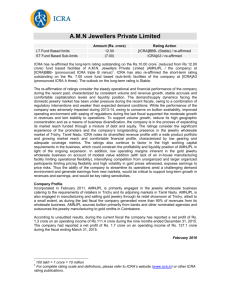
![Rating of [ICRA]AA(stable)](http://s3.studylib.net/store/data/008897864_1-997f5bded17492c22f64602061b0ebeb-300x300.png)
